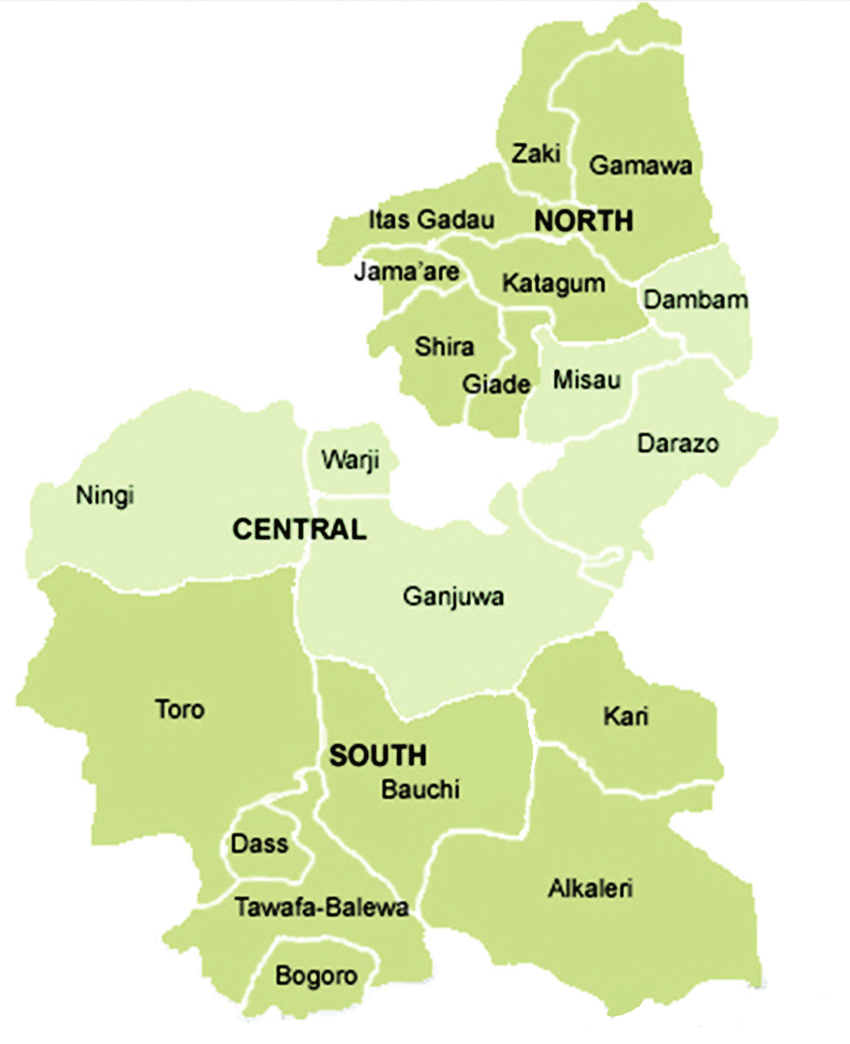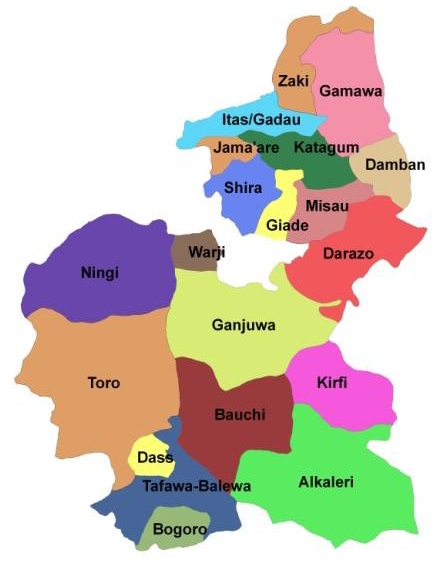Tungan Maliki is an attraction that can be found within the confines of the Yankari National Park.


Unlike all the other springs in the park, Tungan Maliki is a cold water spring and is situated deep in the forest of the park.


Investigations by scientist to establish why the spring is cold unlike others have been unfruitful. The locals like to believe it is a miracle.
Bauchi
Bauchi State has gone through a much transformation since it was created. During the colonial era up to independence, it formed part of the Bauchi-Plateau of the then Northern Region, until the 1967 state creation exercise, when the Bauchi, Borno, and Adamawa provinces constituted the former North-Eastern State.






With the creation of Bauchi state in 1976, then comprising present Bauchi and Gombe states, it included 16 Local Government Areas. The number of Local Government Areas in the then Bauchi State was increased to 20 and later to 23. However, in 1997 when Gombe state was created out of Bauchi and additional local governments were created in the country, Bauchi State was left with 20 Local Government Areas.

Bauchi Local Governments Areas (LGAs)
Bauchi State has 20 (twenty) Local Governments Areas (LGAs), namely: Alkaleri, Bauchi, Bogoro, Dambam, Darazo, Dass, Gamawa, Giade, Ganjuwa, Jama’are, Itas – Gadau, Katagum, Kirfi, Misau, Ningi, Shira, Tafawa Balewa, Toro, Warji, and Zaki.
- Alkaleri
- Bauchi
- Bogoro
- Damban
- Darazo
- Dass
- Gamawa
- Ganjuwa
- Giade
- Itas/Gadau
- Jama’are
- Katagum
- Kirfi
- Misau
- Ningi
- Shira
- Tafawa-Balewa
- Toro
- Warji
- Zaki


List of Bauchi State’s 20 Local Governments Areas, headquarters and land area
| SN | LGA | Area (km2) | Headquarters |
| 1. | Alkaleri | 5,918 | Alkaleri |
| 2. | Bauchi | 3,687 | Bauchi |
| 3. | Bogoro | 894 | Bogoro |
| 4. | Damban | 1,077 | Damban |
| 5. | Darazo | 3,015 | Darazo |
| 6. | Dass | 535 | Dass |
| 7. | Gamawa | 2,925 | Gamawa |
| 8. | Ganjuwa | 5,059 | Kafin Madaki |
| 9. | Giade | 668 | Giade |
| 10. | Itas/Gadau | 1,398 | Itas |
| 11. | Jamaare | 493 | Jamaare |
| 12. | Katagum | 1,436 | Azare |
| 13. | Kirfi | 2,371 | Kirfi |
| 14. | Misau | 1,226 | Misau |
| 15. | Ningi | 4,625 | Ningi |
| 16. | Shira | 1,321 | Yana |
| 17. | Tafawa Balewa | 2,515 | T/Balewa] |
| 18. | Toro | 6,932 | Toro |
| 19. | Warji | 625 | Warji |
| 20. | Zaki | 1,476 | Katagum |
Bauchi State is located between latitudes 9° 3′ and 12° 3′ north of the equator with a total land area of 49,119 km² representing about 5.3% of Nigeria’s total land mass. The state is bordered by seven states; namely Kano and Jigawa to the north, Taraba and Plateau to the south, Gombe and Yobe to the east and Kaduna to the west.
Bauchi state has two distinctive vegetation zones, namely, the Sudan Savannah and the Sahel Savannah. Sudan savannah vegetation covers the southern part of Bauchi state where the vegetation gets richer and richer towards the south, especially along water sources or rivers, but generally, the vegetation is less uniform and grasses are shorter than what grows even farther south, that is, in the forest zone of the middle belt.
Languages of Bauchi State per LGA
| LGA | Languages |
|---|---|
| Alkaleri | Dass; Bole; Duguri; Giiwo; Guruntum-Mbaaru; Labir; Tangale |
| Bauchi | Bankal; Duguri; Dulbu; Galambu; Gera; Geruma; Giiwo; Guruntum-Mbaaru; Ju; Kir-Balar; Labir; Luri; Mangas; Mbat; Pa’a; Polci; Shiki; Tala; Zangwal |
| Bogoro | Sayawa(Za’ar) |
| Darazo | Bole; Deno; Diri; Giiwo; Mburku; Ngamo; Zumbun |
| Dass | Bankal; Dass; Gwak; Polci; Saya; Shall-Zwall; Zari |
| Dukku | Bole |
| Gamawa | Karekare |
| Ganjuwa | Ciwogai; Gera; Geruma; Jimi; Kariya; Kubi; Miya |
| Kirfi | Bure |
| Misau | Fulato/Borno; Shuwa; Kanuri; Hausa; Fulani |
| Ningi | Diri; Gamo-Ningi; Kudu-Camo; Pa’a; Siri; Warji; Geruma |
| Tafawa Balewa | Sur; Vaghat-Ya-Bijim-Legeri; Zari; Bankal; Gwak; Izere; Sayawa(Za’ar) |
| Toro | Bankal; Dass; Geji; Geruma; Gwa; Gyem; Iguta; Izere; Jere; Lame; Lemoro; Mawa; Panawa; Polci; Sanga; Saya; Shau; Tunzuii; Zari; Zeem; Ziriya |
| Zaki | Bade |
Other languages of Bauchi State are Ajawa, Beele, Berom, Kanuri, Kwaami, Manga, Pero, and Piya-Kwonci.

Sahel type of the savannah, which is also known as the semi-desert vegetation, becomes manifest from the middle of the state as one moves from the state’s south to its north. This type of vegetation comprises isolated stands of thorny shrubs. On the other hand, the southwestern part of the state is mountainous as a result of the continuation of the Jos Plateau, while the northern part is generally sandy.
Yankari has become the most developed wildlife park in Nigeria with a lot of attractions for visitors with a wide variety of flora fauna. The park is famous for its variety of animals available for viewing around the year, though the animals are better watched between November and May period of the dry season when the animals converge around the Gaji River in the park.
Bauchi is a city in northeast Nigeria, the capital of Bauchi State, of the Bauchi Local Government Area within that State, and of the traditional Bauchi Emirate. It is located on the northern edge of the Jos Plateau, at an elevation of 616 m. The city has a population of 316,173 (2004). The Local Government Area covers an area of 3,687 km2 and had a population of 493,810 at the time of the 2006 Census.
The city was founded by Yaqub ibn Dadi, the only non-Fulani flag-bearer of the Sokoto Empire. The name was derived from a hunter called Baushe, who advised Yaqub to build his city west of the Warinje Mountain. In return Yaqub promised to name his city after the hunter. Abubakar Tafawa Balewa is buried in the city, while the Yankari National Park is 110 KM from the state capital. The city lies on the Port Harcourt – Maiduguri railway line. The Bauchi State Library Board was established-in-1976.
Bauchi state is a heterogeneous state, with predominant tribes like, Hausa, Fulani, Jarawa, Tangale, Waja, Balewa, Sayawa and Tarewa. It is made up of 20 local government areas, namely: Bauchi, Tafawa Balewa, Bogoro, Katagum, Alkaleri, Dambam, Giade, Ganjuwa, Darazo, Dass, Ningi, Shira, Gamawa, Itas/Gadau, Jam’are, Kirfi, Toro, Warji, Zaki, Misau.
Bauchi state is an agricultural state. Its vast fertile soil is an added advantage for agricultural products, which include maize, rice, millet, groundnut and guinea corn. Irrigation fanning is practiced and supported by the use of dams like Balanga dam, etc. Cattle and other livestock are also reared in the state.
The state has industries like the Bazamri PVC – Wire Limited, Kuda Nails Factory, Yankari Natural Water Company, Zaki Flour Mills and Arewa Ceramic Industry and others.